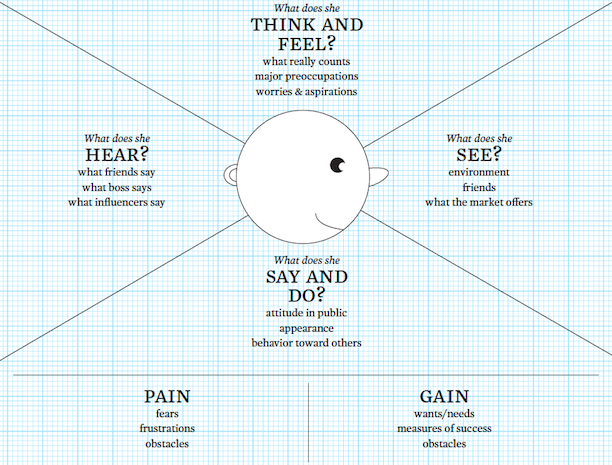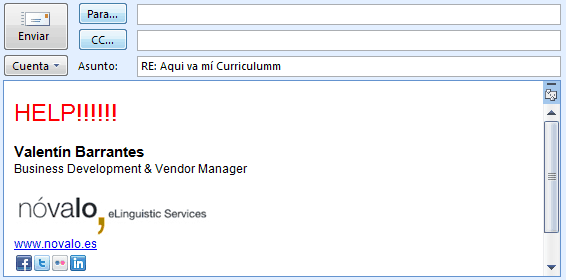
Empathy as a key for success
The different roles I have played along my career, with greater or lesser depth, (freelance translator, in-house translator/editor, training for translators, company management, project/production management, business development, and HR/vendor management) have always forced me to think for some reason in the best way to face my relationships with the people around me in each situation. This might be probably related with the way I behave in my personal life, as I also tend to always observe the people of my environment, finding the best way to behave with them, with greater or lesser success, according to my own perspective as a person. Even if the reason is this natural behaviour, or just a pure need, I tend to watch the way we relate with our environment and, after thinking deeply about it during the last years, and also reading and documenting about the matter, I consider that the greatest part of the success in nearly every job (in fact, I can hardly think in a job where people work really isolated) is based in the way we interact with the rest of the people around us.
It’s also true that in certain areas or specific roles this particular aspect is especially important, but in rare occasions it has no influence to some extent. Let’s see some simple examples in different areas within a company. If we consider the business administration area, we could highlight the way of facing the organisation of the different departments, so we could talk about leadership, authoritarianism, integration, etc. If we take into account the human resources area, we could discuss the staff fair treatment, family conciliation or social responsibility. As for the business or sales department, we could observe aspects such as acquisition of new customers, or customer loyalty. These are just basic notes, as I pretend to put you in context, because what I really want to emphasize in this post, as a common factor for success within professional relationships (and also for personal ones), is the importance of empathy.
According to the definition found in the Spanish dictionary « Diccionario de la Real Academia Española de la Lengua », the definition of empathy is (bear in mind it is a translation from Spanish): « Affective and mental identification of a subject with others state of mind or mood ». Here we have a key to understand the empathy concept. However, I wouldn’t reduce this definition to the state of mind or mood. In fact, I would extend the meaning to associate that identification with the way of thinking, feeling and behaving of the others. The idea is leaving aside our own shoes and try to walk in another’s shoes, abandoning our way of focusing things in order to walk in another’s shoes and look from his or her perspective. The definition of empathy might seem easy, as easy might also seem being empathic, but I think it is much more complex.
To me, empathy is in fact one of the most relevant elements, if not the key, to have success in many professional aspects. I don’t know if you agree with me.
But why do I think so? Because, even if you work for yourself (as a freelancer, for example, a challenging adventure in which the worker is a micro-company integrated by a single employee assuming multiple tasks), or if you are the partner or director of a company, or even if your work in-house for a company, in all cases you will need a great amount of empathy to interact with others and get success.
It will always be useful trying to walk in another’s shoes to understand his or her thoughts, in order to be able to communicate, discuss and negotiate in a fair and equitable manner.
Particularly in our industry, the arena most of the readers of this blog know better, if a project manager, for example, needs to create a team of translators and editors for a highly demanding project in terms of volume, specialisation and deadline, on the way this PM focuses the communication with the people integrating the team can perfectly depend the final success of the whole project. In fact, I would dare to say that, once aspects such as the selection of resources, margin analysis, profitability, or some others, have been analysed it can be really worth taking some time to choose the best way to face the communication with the selected team. I mean, if we know we are facing a complex and challenging project due to several variables, it can be very convenient trying to feel the same way those translators and editors would feel receiving the information from us, in order to agree with them the project conditions in the best possible way. In other words: let’s try to foster empathy with them from the beginning, because we will really save time and avoid problems beforehand. Many managers only think in their particular needs and they focus in solving them just from their own point of view, and it can be a basic error. This behaviour can also be extrapolated to other matters, such as vendor management, team work, etc.
However, in my opinion, empathy is especially important in the case of sales, or commercial relationships. Business development and sales are key parts of a company, as these activities are essential to have new customers, to foster their loyalty, in short, this area is the source of work (and money) of any company. Developing empathy with the customer is basic from the beginning, no matter if the communication is established through email, a telephone call or in person. Each of these actions require different communication approaches in order to promote empathy, as communication in writing, over the phone or face to face is different in each situation. But we should always try to understand what our customers need and identify their desires to make them trust us, and we should try to know which obstacles or fears they face, so that we can make them disappear. Our customer is a person like any other, so we must try to find links and feel close to our customer, while our treatment should be professional, balanced and open. It is said that in our times listening to the others is less important than it used to be, as we usually focus our attention in ourselves as much as possible, in selling our product or highlight its qualities no matter what we have to do, and this can be one of the common mistakes. Sometimes, it is better to pay more attention to the problems we are going to solve to our client with our product or service, focusing our approach on their need of acquiring our product or service, than in our need of selling it to them. Thanks to the empathy, a healthy relationship can be created and grow with mutual understanding, and it will be a long lasting one, that can be further consolidated thanks to periodic loyalty actions carried out with the same aim. Of course, every person is unique, some people prefer to go straightforwardly to the point, other prefer receiving more exhaustive explanations, some others are better attracted to visual effects, and some others are captivated by a clear speech, etc. There are many variables and it depends on each of us to properly adapt ourselves to every situation.
In the way we communicate with our customers and providers, no matter the channel we use (written, phone, face to face, etc.), empathy should be always be present, as it will contribute to obtain good results. This is true for the translator working from home, for the project manager working in a company, for the sales person, for the managers of each department, etc.
But I ask myself if empathy can be learned. Is it a natural ability or can we be trained in some way?
Under my point of view, a part of our predisposition to show empathy is defined in our personality or the intuitive abilities of each of us, however, we can work in order to be more conscious of the importance of empathy and we can find ways to foster it in our life. I hope this article itself can even foster awareness about this important question.
I like reading about similar topics for my job, and when I was searching information for this post, I came across a tool I have found on the web called « Empathy Map », a very useful resource within the so called Design Thinking, and I would like to talk you about this tool. Design Thinking is a trend originally related to the design of products and services, based on the creativity used during the developing phase, but it can be also applied to other fields, such as marketing. The « Empathy Map » is a resource developed by the company XPLANE (http://xplane.com/) and it has been widely spread in different areas. You will be able to find different articles about it on the web, treated from multiple perspectives.
In fact, this tool is useful because it is based on empathy. It tries to identify the best way of establishing relationships, with the aim at obtaining an effective communication and treating the people we interact with as real people, with fears and wishes, but also as key influencers on important decisions affecting us. The map proposes carrying out a material representation of the development of our actions, and it is organised in several phases: segment (identify our target), humanise (understand we are interacting with a real person), emphasize (in this step we create the empathy map answering to multiple questions you will find below) and validate (approve and confirm our proposal).
During the empathy step we will design a sort of canvas with different questions, that will help us drafting our action line. It is easier to see a visual representation, as follows:
I am sure answering to these questions will help us having success during the development of any content, product, service, strategy, etc. But apart from obtaining value from a useful and specific resource like this one, what we should do during our everyday life is having always in mind that empathy can take us much further than any other way of behaviour. Don’t you think so?
Now I would like to know your opinion about empathy. Do you practice this exercise in your personal or professional life?






Sin respuestas a "Empathy as a key for success"